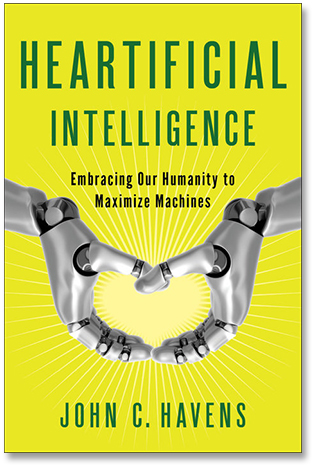Heartificial Intelligence, book review: A question of values


Heartificial Intelligence: Embracing Our Humanity to Maximize Machines • by John C. Havens • Tarcher Penguin • ISBN: 978-0-399-17171-0 • 304 pages • $16.95
"Toasters are mean little buggers," John C. Havens writes at the outset of Heartificial Intelligence, by way of explaining why our human values matter so much that we should not wait for the Singularity to think about the impact of AI.
Havens, a technology journalist, TEDx speaker, and former PR person, starts with the presupposition that AI is going to happen, whether we like it or not. Therefore, he argues, we should take an interest in how it develops, rather than whether it should or how fast it will happen.
Others talk about privacy by design (or security by design), but Havens is interested in values -- or ethics -- by design. To date, he notes with some concern, every discussion of AI ethics starts, and probably ends, with either wild hype for its benefits or impending doom for we humans.
Overtaken by events
Havens was, of course, writing before the latest developments. One of these upends one of the fictional future scenarios with which he opens each chapter: Google's announcement that it will sell its Boston Dynamics robotics division. Similarly, the book was published before Google-owned DeepMind's AlphaGo AI software beat South Korean human Go champion Lee Sedol, winning four games out of five. Still, DeepMind founder Demis Hassabis and Havens clearly share a worldview.
At a discussion meeting to cover the latest developments in AI at the Royal Society last year, Hassabis spent part of his presentation talking about the importance of thinking about how to deploy and control AIs, a concern that is certainly more than just words: a condition DeepMind placed on the 2014 acquisition was that Google would set up an AI ethics board. The company has reportedly done this, but has so far declined to identify its members.
Although the writing befits a mass-market book, Heartificial Intelligence is structured like a textbook, or perhaps a lengthy white paper. The bulk of the introduction, some 25 or so pages, seems to be an executive summary, although if I had to guess I'd say it was the proposal Havens used to sell the book to his publisher.
The rest of the book works through the summary piece by piece, covering the impact AI is likely to have on areas such as economics, employment, privacy, and human values. Each chapter ends with a summary list of the primary ideas from the chapter. The final chapter invites the reader to complete a quiz to determine their own values.
The overall effect is to make the book feel rather choppy, but Havens' point is not to create a lengthy argument that tells everyone else how to think. Instead, he hopes to provoke each of us into finding our own answers to the questions he presents.